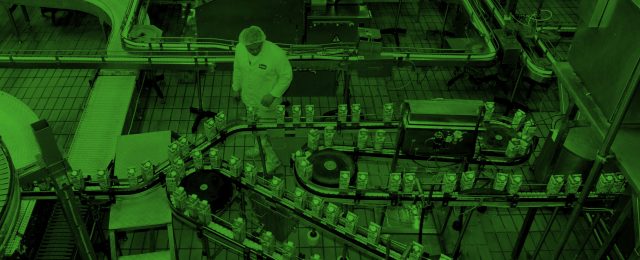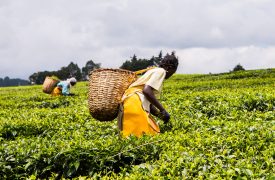G7 launch pledge for business action towards a sustainable and resilient food system

On December 16 2021, the G7 launched the Sustainable Supply Chain Initiative convening global food and agriculture companies to pledge to improve the environmental, social and nutritional impact of their operations and supply chains. The objective is to accelerate global progress towards the Sustainable Development Goals and within that, to specifically transform food systems to be more sustainable, inclusive and resilient. See official G7 statement
We are thrilled to see the launch of the G7 Sustainable Supply Chains Initiative which brings together companies and governments to drive up sustainability standards throughout the food and agriculture value chain. The Initiative is grounded in a firm commitment from firms to act and the participation of WBA’s Food and Agriculture Benchmark in measuring and reporting on this action brings welcome rigour and specialist insight to the Initiative.
Simon Calvert, Senior Commercial Agriculture Adviser at UK Foreign, Commonwealth and Development Office (FCDO)
As part of this initiative, 22 companies* pledge improvement as measured by the World Benchmarking Alliance’s Food and Agriculture Benchmark. Collectively, these companies earn over 550 billion USD in annual global revenue, employ over 2 million people directly with millions more throughout their supply chains, and represent both upstream and downstream segments of the value chain.
Food can help solve many of the challenges we see today, from climate change to malnutrition. But no company can transform the food system alone: we need innovative collaboration with government leaders, so that we build a bridge between public policy and business practice. That’s what this initiative is about, and Danone is honoured to contribute to it. Together, we can understand where the gaps are greatest, and how we might work together to fill them by driving more sustainable supply chains and operations in our companies. Tracking collective progress is crucial, which is why we welcome collaboration with the World Benchmarking Alliance.
Laurent Sacchi, Executive Vice President and General Secretary, Danone
The role of the World Benchmarking Alliance (WBA) as an independent monitoring mechanism is to review company progress and embed accountability. WBA’s insights will showcase leading business practices and identify the wider actions needed from businesses and governments to make progress towards realising food systems transformation.
In late 2022, companies participating in this initiative will receive a confidential scoring using the benchmark methodology, as well as a publicly available analysis of the collective progress of all companies. In 2023 WBA will publish the second full iteration of the Food and Agriculture Benchmark, including updated individual company scorecards.
Our world lacks a mechanism to hold its most influential food and agricultural companies accountable on their impact, and as a result we see that the majority of companies avoid their responsibility and don’t take the urgent action that is needed. Equally, those companies that do lead and live up to their responsibility are not rewarded accordingly. Therefore, the World Benchmarking Alliance will continue to benchmark the performance of the world most influential food and agriculture companies over course of the coming decade, in a way that is freely and publicly available.
Gerbrand Haverkamp, Executive Director, World Benchmarking Alliance
Aviva, Macquarie and Ardevora – Investors part of WBA’s Alliance – have demonstrated their support of the initiative by actively encouraging companies to sign up to the initiative and by signing an Investor Statement. In doing so, these investors recognise the actions of these companies are strengthening the expected norms of sustainable business and have the power to drive up standards across the sector. We encourage more investors to support the initiative.
We are supportive of the G7 Sustainable Supply Chain Initiative and encouraged by the leadership already shown by 21 global food and agriculture businesses. As investors, we seek to drive a global food system that delivers better nutrition while enhancing farmers’ livelihoods, positive labour practices, and practices that sustain natural resources and the delicate, invaluable relationship with our natural environment.
Aviva Investors
Next year the German government will hold the G7 presidency and they have expressed strong support of the initiative and to bring together companies to understand the successes and challenges faced by companies engaged and to identify further actions needed from all stakeholders.
The OECD, which includes all G7 members, welcomes this effort and shares the ambition to improve the sustainability, resilience, human rights and climate impact of global food and agricultural supply chains. WBA will work closely with the OECD to facilitate the initiative, bringing insights to the improvement of responsible business practices and explore how to drive responsible business conduct as recommended by the OECD-FAO Guidance for Responsible Agricultural Supply Chains.
*
| 2Sisters
Associated British Foods BASF SE Bayer AG Compass Danone Diageo ED&F Man Ingredion InVivo Kraft Heinz |
McCain Foods
McCormick Meiji Holdings Co., Ltd. Morrisons NH Foods PHW Group (Wiesenhof) Sainsbury’s SEVEN & i HLDGS. Co., Ltd. Sodexho Tate & Lyle Unilever |
Bayer is partially using WBA metrics and NH Foods will use other indices to track progress


